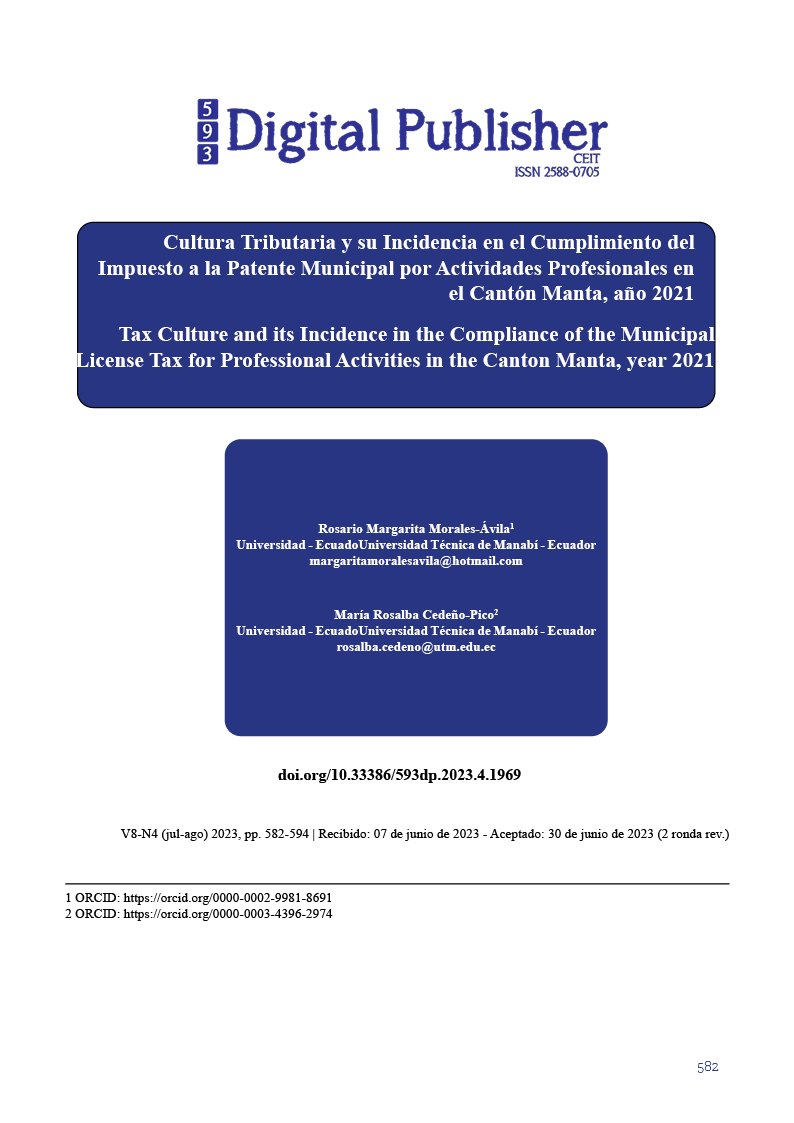Tax Culture and its Incidence in the Compliance of the Municipal License Tax for Professional Activities in the Canton Manta, year 2021
Main Article Content
Abstract
Tax collection is an important element for the development of a country, where the taxes or tributes that are paid by citizens, merchants, professionals, among other economic entities that carry out activities that generate profit, are a fundamental part that will provide a resource vital to invest in services that benefit citizens, as well as to obtain the financing of other state institutions that also provide some service to the citizens of a region. The tax culture is marked by a system of values ethics that citizens must have, based on understanding the need to give the nation its economic part in order to contribute to the sustainable development of their country, in Ecuador the law of Taxation includes a municipal patent tax payment for professional activities, which is mandatory in order that professionals who do not depend on a labor relationship can pay the respective tax for the development of their professional activities. The objective of this research is to establish the incidence of a tax culture in the cancellation of the municipal license tax for professional activities in the Manta canton. The methodology is quantitative descriptive, by means of a survey applied to 80 professionals, the relationship between the tax culture and the payment of said tax is determined. It is concluded that despite the fact that taxpayers know their tax obligations, it does not indicate that they make their payments on time.
Downloads
Article Details

This work is licensed under a Creative Commons Attribution-NonCommercial-ShareAlike 4.0 International License.
1. Derechos de autor
Las obras que se publican en 593 Digital Publisher CEIT están sujetas a los siguientes términos:
1.1. 593 Digital Publisher CEIT, conserva los derechos patrimoniales (copyright) de las obras publicadas, favorece y permite la reutilización de las mismas bajo la licencia Licencia Creative Commons 4.0 de Reconocimiento-NoComercial-CompartirIgual 4.0, por lo cual se pueden copiar, usar, difundir, transmitir y exponer públicamente, siempre que:
1.1.a. Se cite la autoría y fuente original de su publicación (revista, editorial, URL).
1.1.b. No se usen para fines comerciales u onerosos.
1.1.c. Se mencione la existencia y especificaciones de esta licencia de uso.
References
Alzate, J. (1 de Mayo de 2020). La profesión contable en un contexto de incertidumbre. Más allá de la pandemia. Revista Visión Contable(21), 5-10. doi:https://doi.org/10.24142/rvc.n21a1
Barona, N., Delgado, M., & Bonifaz, A. (15 de Agosto de 2022). Software contable como herramienta de optimización de procesos financieros, contables y administrativos. Cienciamatria. Revista Interdisciplinaria de humanidades, educación, ciencia y tecnología, 8(4). doi:DOI 10.35381/cm.v8i4.890
BBC. (5 de Mayo de 2022). BBC Mundo. Recuperado el 2 de Abril de 2023, de BBC Mundo: https://www.bbc.com/mundo/noticias-61333739
Bustamante-Santos, A. P. (27 de Marzo de 2023). Cultura Tributaria y su incidencia en el cumplimiento de los deberes tributarios en Arévalo Repuestos y Suministros de Línea Blanca ARLB. CIA.LTDA. FIPCAEC, 8(1), 550-560. doi:https://doi.org/10.23857/fipcaec.v8i1
Cortes, G., Henao, N., & Osorio, V. (2020). Trabajo remoto en tiempos de COVID-19 y su impacto en el trabajador. Bogota: Pontificia Universidad Javeriana. Recuperado el 2 de Abril de 2023, de https://repository.javeriana.edu.co/bitstream/handle/10554/52814/Gabriela%20Corte%cc%81s%2c%20Nicolas%20Henao%2c%20Valentina%20Osorio%2c%20Diciembre%202020%20%281%29.pdf?sequence=1&isAllowed=y
Cruz, M. (Diciembre de 2022). El trabajo remoto y la motivación laboral en tiempos de pandemia. Question/Cuestión, 73(3). doi:http://https//doi.org/10.24215/16696581e762
De la Rosa, M. (11 de Noviembre de 2022). La Gestión Contable Sostenible en la nueva normalidad. Trascender, Contabilidad y Gestion, 7(20). doi:https://doi.org/10.36791/tcg.v8i20.169
Escobar, D. (2022). XLIII Simposio Nacional de Profesores de práctica profesional. Identificación de los riesgos de los registros contables alojados en servicios de computación en la nube (pág. 9). Mendoza: Facultad de Ciencias Económicas Universidad Nacional de Cuyo. Recuperado el 3 de Abril de 2023, de https://www.aacademica.org/escobards/22.pdf
Fernandez, R., Cera, G., & Adriano, K. (2020). Contabilidad en la nube: una alternativa para el teletrabajo. Revista Cubana De Finanzas Y Precios, 4(4), 19-31. Recuperado el 2 de Abril de 2023, de https://observatorio.anec.cu/uploads/6fa162ee-8610-4b94-b7fa-598c9f95b67e.pdf
Hurtado, F. (5 de Mayo de 2020). Fundamentos Metodológicos de la Investigación: El Génesis del Nuevo Conocimiento. Revista Scientific, 5(16), 99-119. doi:https://doi.org/10.29394/Scientific.issn.2542-2987.2020.5.16.5.99-119
Lominchar, J. (2020). Visión del cambio Covid-19: impacto en la fuerza de trabajo y profesionales autónomos. Revista Venezolana de Gerencia(25), 12-31. Recuperado el 2 de Abril de 2023, de https://www.produccioncientificaluz.org/index.php/rvg/article/view/35213/37275
Mendieta, P. (1 de Diciembre de 2018). La Educación como Apoyo en el Fortalecimiento de la Cultura Tributaria. INNOVA Research Journal, 3(12), 148-158. Recuperado el 29 de Junio de 2023, de https://dialnet.unirioja.es/servlet/articulo?codigo=6828559
Palma , A., Plùa, K., & Cedeño, J. (5 de Diciembre de 2022). Cultura tributaria y su incidencia en el cumplimiento de obligacionesfiscales Quevedo, 2022. LATAM Revista Latinoamericana de Ciencias Sociales y Humanidades, 3(2), 1433-1450. doi:https://doi.org/10.56712/latam.v3i2.193
Rodriguez, M. (Junio de 2020). La Contabilidad en tiempos del COVID-19. Contabilidad y Auditoria. Recuperado el 2 de Abril de 2023, de https://ojs.econ.uba.ar/index.php/Contyaudit/article/view/1744/2487
Saltos , E., & Twousend, J. (1 de Noviembre de 2020). La seguridad informática en la adopción del cloud computing en la información del sector industrial. Revista Ciencia & Tecnología, 21(29), 57-71. Recuperado el 2 de Abril de 2023, de https://www.uteg.edu.ec/wp-content/uploads/2022/10/08_art.2021.pdf
Torres, P. (29 de Enero de 2021). Covid-19: Teletrabajo en tiempos de pandemia. Historia y comunicación social, 26(Numero Especial), 11-18. doi:https://dx.doi.org/10.5209/hics.74237
Vizcaino, A., & Becerra, G. (21 de Octubre de 2019). Uso de un software contable como estrategia en el proceso de enseñanza de la asignatura de contabilidad. Revista Espacios. Recuperado el 3 de Abril de 2023, de https://www.revistaespacios.com/a19v40n36/a19v40n36p01.pdf
Weller, J. (2020). La pandemia del COVID-19 y su efecto en las tendencias de los mercados laborales. Comisión Económica para América Latina y el Caribe (CEPAL). Recuperado el 2 de Abril de 2023, de https://repositorio.cepal.org/bitstream/handle/11362/45759/1/S2000387_es.pdf

